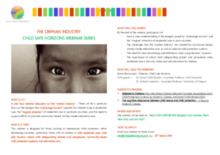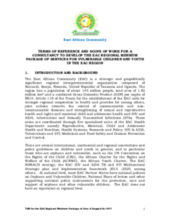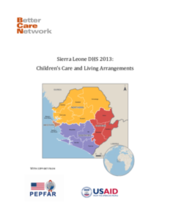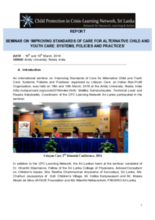Demographic Data
|
Sources: World Bank, UNICEF, UNDP HDR 2015, DHS 2011 |
Displaying 10761 - 10770 of 14391
The East African Community Secretariat in collaboration with Regional International Interagency Task Team on Children and AIDS in Eastern and Southern Africa (RIATT-ESA) is seeking the services of a consultant to develop a Minimum Package of Services for Vulnerable Children and Youth (VCY) in the EAC Region.
In this article, the author discusses "voluntourism", where volunteers travel to other countries for a week or two for a “project” — a temporary medical clinic, an orphanage visit or a school construction. A 2008 study estimated that 1.6 million people volunteer on vacation, spending around $2 billion annually.
This country care review includes the care-related Concluding Observations adopted by the Committee on the Rights of the Child.
This country brief provides an overview of data on children’s living arrangements in Sierra Leone extracted from the 2013 DHS survey.
UNICEF, UNFPA and partners are will host: #ENDviolence against Children and Adolescents with Disabilities, a side event for the 60th Session of the CSW and for World Down Syndrome Day
In this report, Lumos welcomes actions taken by the Republic of Moldova to prevent child abuse and exploitation during the period between 2011-2015. Lumos further notes c
People with psychosocial disabilities (mental health conditions) in Indonesia are shackled or forced into institutions where they often face physical and sexual violence, and involuntary treatment including electroshock therapy, seclusion, restraint and forced contraception. Human Rights Watch examines how people with psychosocial disabilities often end up chained or locked up in overcrowded and unsanitary institutions, without their consent, due to stigma and the absence of adequate community-based support services, including mental health care.
This document reports on Udayan Care's international seminar on ‘Improving Standards of Care for Alternative Child and Youth Care: Systems, Policies and Practices’
This article discusses Tunisia's anti-drug laws that mandate automatic, one-year sentences, which has led to overcrowded prisons and separation of families. The author describes recent encounters with imprisoned women, including some who were imprisoned for smoking marijuana.






